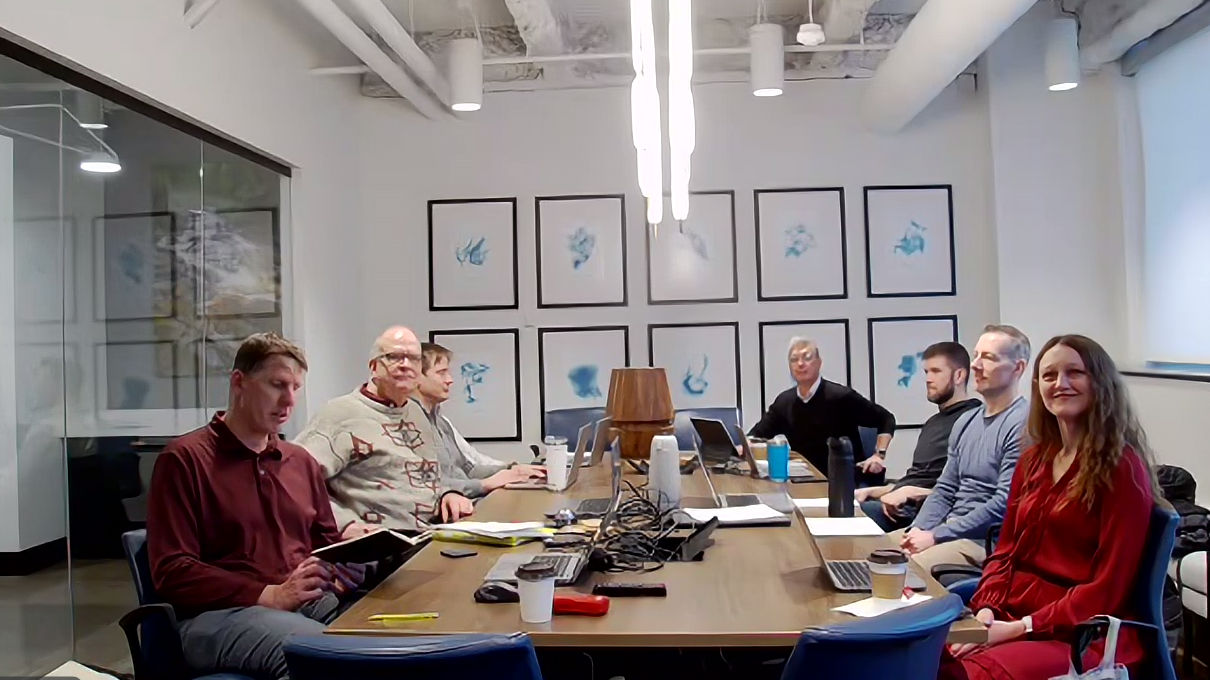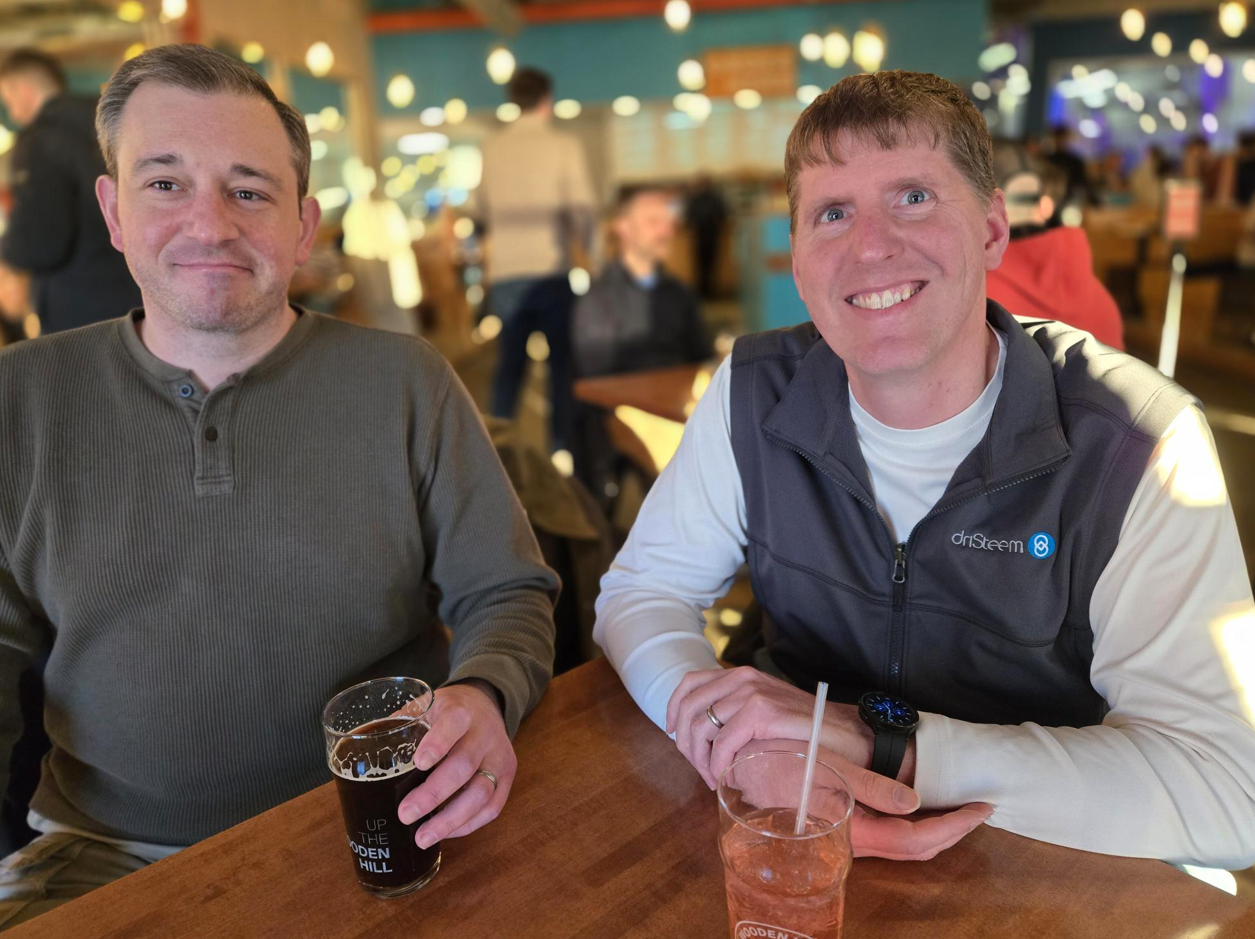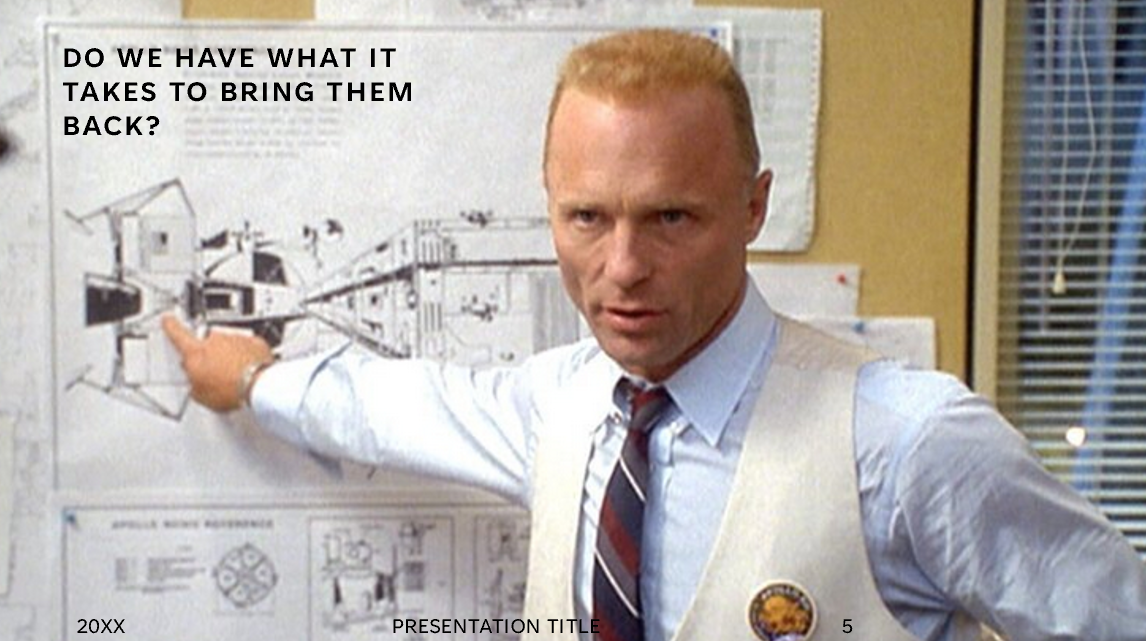 @MikeBenkovich
@MikeBenkovich
Today’s Relaxation meeting was all about the theme “Serenity Now”—a little calm, a little chaos, and a lot of fun. We had 16 people join in, with Loras leading a website review and the team rolling through updates from David, Kyle, Brad, Tony, and Benko to keep things moving and productive.
Then things got creative fast. We heard everything from Michelle’s invisible Disney adventure to Hazel bending time, Mitch going full secret agent, and Khalid channeling Reality TV / Mr. Beast energy. Nathaniel went big with singularity vibes, Sam took us into the Inferno Dallol Depression, and Darryl brought an icebreaker on zig-zag careers. Shoutout to Khalid as the Wise Old Owl, Sam & Darryl for the Word Picture, and Alicia as Better Evaluator—proof that serenity doesn’t always mean quiet… sometimes it means laughing together.

Techmasters is for working on improvement in speech and leadership but we do take time to enjoy life also. All work and no play makes Jack a dull boy! On Friday, February 6, a group of us met at Wooden Hill Brewing in Edina for chat, drinks, and chow. We strive for quality in our work and good times in our recreation.

Imagine you’re handed a pile of bricks, lumber, and nails—no blueprint, no plan, no guidance—and told, “Build me a fortress that will stand for centuries.” You start stacking bricks, hammering boards. You hope your walls are straight, your gates secure, your ramparts high enough to repel invaders. You pray you remember every measurement, every joist placement, every bolt torque.
That… is how most organizations still build their cloud environments today. We hammer in security rules by hand. We patch servers one by one. We scramble to recover from failures without a guide. And when disaster strikes, the walls collapse like a house of cards.
Now, picture a different scene: You stand at your keyboard, you click run—and lines of code that you defined every server, every network, every firewall rule start running. You press Deploy, and in minutes your fortress rises, identical in every test environment, every region, every time. No guesswork. No finger-crossing.
-
Consistency in Every wall is laid true to the requirements and design.
-
Secured Every gate is reinforced with best practices and security guidlines in mind
-
Every tower has a lifeline (backups and DR).
Your environment is no longer a fragile assembly of one-off changes. It is a living artifact, defined in Code, versioned in Git, peer-reviewed, tested like your application code.
Why You Can’t Afford to Wait
-
Human Error becomes a myth: No more fat-fingered deletions or midnight firefights.
-
Configuration Drift is dead: What you tested in staging is exactly what runs in production.
-
Recovery is an automated heartbeat: Spin up the exact replica of your world in another region in minutes.
-
Compliance & Audit happen by default: Every change is a pull request you can trace, review, and rollback.
-
Cost Control is built-in: Tear down ephemeral environments the moment you’re done with them—no more orphaned servers quietly burning your budget.
This isn’t a “nice to have.” It’s the difference between surviving the next storm or watching your walls crumble.
The Forge: Tools of the Trade
-
ARM Templates & Bicep: Native Azure blueprints with first-class support and modularity.
-
Terraform: Multi-cloud sorcery that speaks the language of AWS, GCP, and Azure alike.
-
Pulumi: Write your infrastructure in C#, TypeScript, or Python—turn your Dev skills directly into cloud metal.
Each of these is your blacksmith’s hammer, your crucible for shaping resilient infrastructure.
Call to Action — Five Minutes to Build Your First Wall
I’m asking for five minutes—a small investment for a giant leap in reliability. In five minutes, I’ll show you how to:
-
Define a simple network, a VM, and a load balancer in code.
-
Deploy it repeatedly, in any region, with zero manual steps.
-
Tear it down when you’re done, so you only pay for what you use.
By the end of that demo, you’ll see how IaC transforms your cloud from a labyrinth of one-off scripts into a codified, battle-tested fortress.
The choice is yours
You can keep building with mortar and guesswork. You can cross your fingers and hope nothing breaks. Or… you can forge your infrastructure in code, version it, test it, and trust it to stand against any siege.
Which would you rather have—sandcastles or stone fortresses?
Five minutes is all it takes. Let me show you the blacksmith’s forge. Let’s build something that lasts.
Craftmanship
In a world now shaped by lines of code and machine-learned patterns, a quiet revolution hums in the background—AI. It's no longer science fiction or Silicon Valley secret sauce. It's here, in our browsers, our inboxes, our pockets. It writes, it reasons, it even reflects. And the playing field? It’s flattening faster than ever.
With tools like ChatGPT, anyone can draft a proposal, outline a sermon, brainstorm a business plan, or even compose a poem. What once required a team of experts or years of experience now takes a well-phrased prompt and a few seconds. It's as if the gates of capability have been thrown wide open—and everyone is handed a key.
And yet, like a chisel in the hand of an artist—a Michelangelo who sees David within the marble—a tool’s power is not in its edge but in its vision. The chisel is lifeless without the hand that guides it. The masterpiece is not in the tool, but in the eye that sees what is possible and the hand that makes it so.
For example, I use AI when I work on these reflections. Not to create the thoughts, but to clarify them, suggest wording, and massage phrasing. It helps me find the words I’m reaching for—the turn of phrase just out of reach, the tone that best fits the story I’m trying to tell. It’s like having a second set of eyes on the page—one that helps me refine, not define, what I want to say.
In woodworking, you can’t just turn on a table saw and expect a masterpiece, it takes learning and respect. A router in the hands of a novice can ruin a beautiful slab of walnut. A dovetail jig—when misunderstood—turns precision into frustration. These tools are not inherently magical. They multiply the intention and skill of the one who holds them.
So it is with AI.
These tools don’t make us obsolete. But not learning them might. When innovation gallops forward like a stallion in full stride, standing still is the same as falling behind. If we treat these tools with suspicion or apathy, we risk becoming craftsmen in a world of machines, holding chisels while others operate laser cutters.
The danger isn't just being replaced—it's becoming irrelevant by refusing to adapt.
And this is not only a personal warning—it’s a call to leadership. If we’ve been given the experience of years, the scars of failure, the insight of context—then we have a responsibility to bring others along. To not just use the tools ourselves, but to teach them. To demystify them. To be the older carpenter who shows the apprentice not only how to use the saw, but how to respect it.
This moment in time isn't just about productivity—it’s about legacy.
Because while AI can replicate content, it cannot replace character. It cannot teach common sense. It cannot walk with someone through the slow grind of growth or the sacredness of learning by doing. That’s our role. That’s our gift. To reach back while we step forward.
The tools are changing. The craft is evolving. But the need for wisdom, courage, and mentorship? That has never been more vital.
What do we do?
Learn the tools—explore the possible with them. Share them. Teach your team. Teach your kids. Learn out loud so others can learn with you. Because staying relevant isn’t just about surviving—it’s about making space for others to thrive.
And when the world asks, “What makes you different from the machine?”—show them your scars, your stories, your steady hand. Show them your heart.
Because AI may change the craft—but it will never replace the craftsman.
In the grand cathedral of existence, each of us is akin to a stained-glass window—distinctive in design, hue, and purpose. These windows, when illuminated by the sun's rays, project a kaleidoscope of colors, captivating all who behold them. Similarly, our individual talents and gifts, bestowed upon us by the Divine, are meant to shine brightly, casting our unique light into the world.
Yet, how often do we, like chameleons, attempt to blend into the tapestry of societal norms? We mute our vibrant colors, fearing that standing out might lead to isolation or judgment. But consider this: a stained-glass window devoid of light remains dark and unremarkable. Its true beauty emerges only when it allows light to pass through, revealing the intricate artistry within.
Elisabeth Kübler-Ross, a pioneering psychiatrist best known for her work on the stages of grief and the inner journey of the soul once observed, "People are like stained-glass windows. They sparkle and shine when the sun is out, but when the darkness sets in, their true beauty is revealed only if there is a light from within." This profound metaphor underscores the importance of nurturing our inner light, especially during times of adversity. It's not the external validation that defines us, but the internal radiance that we cultivate and share.
Imagine a garden where every flower strives to be a rose, dismissing its inherent nature. The result would be a monotonous landscape, lacking the diversity that makes a garden truly enchanting. In the same vein, when we suppress our individuality to conform, we rob the world of the rich tapestry of human expression intended by our Creator.
Reflecting on this, it's evident that our preoccupation with social acceptance can be a dimmer switch on our potential. We were not crafted to be mere reflections of societal expectations but to be luminous beings, each contributing a unique shade to the mosaic of life. As the Apostle Paul reminds us, "We have different gifts, according to the grace given to each of us." Embracing these gifts is not an act of defiance but an act of faith and gratitude.
Therefore, let us endeavor to polish the panes of our souls, allowing the light within to shine unhindered. Let's celebrate our differences, understanding that, like stained glass, our diversity creates a masterpiece that is both beautiful and divine. In doing so, we honor not only ourselves but also the Artist who designed us with intentionality and love.
Call to Action:
Take a moment to ponder: Are you dimming your light to fit into a mold never meant for you? What unique colors and patterns has the Divine Artist painted within you? Embrace them. Let them shine. For in the symphony of light and color that is humanity, your note is essential, your hue indispensable.
Winnie the Pooh once said, “Nothing is impossible. I do that every day!”—a phrase so delightfully whimsical, it could only come from a bear who lives on honey and wonder. But as endearing as it sounds, living that out feels less like a gentle stroll through the Hundred Acre Wood and more like sprinting up an escalator that’s going down, arms full of tangled responsibilities.
Lately, I’ve been racing from thing to thing like a circus performer juggling flaming bowling pins on a tightrope. I’ve got to be at the airport by 8:45. I’ve got to fix the demo before the big presentation. I’ve got to keep the clusters alive. I’ve got to remember passwords, pack chargers, chase deliverables, answer emails, and do my job. Get out of my way—I'm coming through like a freight train with no brakes, trying to arrive everywhere all at once.
In the chaos, it’s easy to forget something essential: Who gave me this plate I keep piling so high? And am I even walking in the direction that plate was meant to carry me?
Chris Stefanick, who shares his heart through the Hallow app and his podcast, recently spoke of a book that caught my attention: The Ruthless Elimination of Hurry by John Mark Comer. Even the title is a paradox—how do you “ruthlessly eliminate” something as slippery and seductive as hurry? It clings to us like static on a sweater. But the truth in his message is profound: we must intentionally, courageously, even ruthlessly step off the treadmill we so often mistake for the path.
In one of his men’s devotionals, Stefanick reflects on the idea that rest isn't a reward for work—it’s a rhythm for life. Like the beat in a piece of music, the rests give the song shape. Without pauses, it's just noise. But in our modern cadence, where faster means better, and more means worthier, rest feels like weakness. It’s the skipped step we promise ourselves once we’ve “earned” it… but never quite do.
I confess, I struggle with this. I love being productive—crossing things off my list is like taking a victory lap around the day. I like feeling capable, on top of things, in control. It’s addictive, like standing atop a tower built from checkboxes. But sometimes I wonder: am I really keeping my cup half full, or am I just upgrading to a bigger cup?
How do I pause when everything feels so urgent?
How do I trade my sprint for a stroll without guilt chasing me down like a shadow that won’t be left behind?
How do I hear the still, small voice when my world is a blur of movement and motion?
The truth is, rest doesn’t come naturally—it comes intentionally. It’s like Sabbath bread, baked on purpose and shared slowly. It’s like watching the sun rise, not because you have time, but because you make time. Rest is the holy permission to just be, not because we’ve done enough, but because we are enough.
Maybe slowing down is not a failure of ambition, but a recalibration of direction. Like a ship adjusting its sails to catch a better wind. Maybe being still isn’t stopping—it’s anchoring. And maybe that plate I’ve been piling high wasn’t meant to be a platter of performance, but a place-setting for presence.
Call to Action:
What would it look like today to ruthlessly eliminate hurry from your soul—even if just for a moment? Could you choose to sit, to breathe, to listen? Could you set down the to-do list and pick up your life? Could you let your cup be filled—not with more, but with meaning?
Because sometimes the most radical thing you can do is not conquer the day, but simply be in it.
Went on a retreat this weekend, and there was a talk that dove into an interesting way of looking at things. Instead of doing things so that I have and I can then declare what I am, we look at what I am, so therefore I have some things, which mean that I do things. To me it was an intriguing way of looking at life, that as a christian I am loved by God, that being loved I have security to know that I am empowered by his love to do things which are aligned with his mission.
I do --> I have --> i am
vs
I am --> I have --> I do
---
Are You Climbing the Wrong Ladder? The Power of Being Before Doing
We’re taught from a young age that success follows a simple pattern: Work hard (Do), get the rewards (Have), and then you’ll be happy (Be).
It sounds logical.
It even seems to make sense.
But what if that ladder we’ve been climbing is leaning against the wrong wall?
Chasing Success, But Feeling Empty
A friend of mine once poured everything into getting a promotion. Early mornings, late nights, checking emails at all hours—he was doing everything he could to climb higher. And eventually, he got it.
The title. The raise. The corner office.
But something strange happened.
He wasn’t any happier. In fact, he felt… the same. A little emptier, even.
Because deep down, he realized he had spent years chasing something he thought would define him, instead of defining himself first.
Flipping the Script: Be → Have → Do
Most people live by the idea that if they just work harder (Do), they’ll get what they want (Have), and only then will they feel like the person they want to be (Be).
But the truth is, it works the other way around.
Be → Have → Do.
- Who you are determines what you have and what you do.
- When you start with identity, the right actions flow naturally.
- Instead of waiting for success to define you, define yourself first.
Success isn’t about climbing faster—it’s about making sure your ladder is against the right wall.
The Power of Identity
Think about it.
If you see yourself as a leader, you act like one.
If you believe you’re confident, you carry yourself that way.
If you know you’re disciplined, your habits reflect it.
But if your identity is tied to external validation—titles, money, or approval—then you’ll always be chasing something outside yourself, never truly arriving.
Call to Action: Start With Being
Here’s the challenge: Flip the script.
- Decide who you are first. Instead of waiting to feel confident, choose to be confident. Instead of chasing success, start with the mindset of someone who already has it.
- Let identity drive action. When you focus on being, the right habits follow naturally.
- Trust that the results will come. The right identity creates the right actions, and the right actions lead to success.
Final Thought: Who Are You Becoming?
At the end of the day, it’s not about what you achieve—it’s about who you are.
So instead of asking, “What do I need to do to be successful?” ask:
“Who am I becoming?”
Because when you start with being, the doing and having take care of themselves.
And maybe—just maybe—you’ll realize you don’t need to climb higher.
You just need to make sure your ladder is leaning against the right wall.
How did we get to a point where we’ve lost our sense of wonder?
Ever asked the question of what happened to wow? Welcome everyone! Today, we’re talking about rediscovering wonder in everyday life. We live in an incredible time, yet we often take things for granted, and that the smallest actions can have lasting impact. Let's explore how shifting our mindset can change that.
This morning, my Fitbit buzzed on my wrist, waking me up right on time. This tiny device is packed with sensors that track my steps, heart rate, and movement—constantly processing data to give me insights about my life. It tells me where I’ve been, where I am, and even gives clues about where I’m headed.
That’s incredible.
Not too long ago, I had a simple watch that had to be wound up—and it didn’t even show the date. Later, I upgraded to a digital watch that beeped when the alarm went off. And now? My smartwatch does things that would have been mind-blowing to my younger self.
It doesn’t just tell time; it syncs with my phone, vibrates when I get an email, reminds me to stand up, and even helps track my health.
And yet, instead of being amazed, I barely think about it.
Why is that?
Perspective Shift: Everything is Amazing, But No One is Happy
I heard a quote recently:
"Everything is amazing, and no one is happy."
It reminded me of a conversation I had with someone who was complaining about their last business trip.
They were frustrated that their flight was delayed by an hour, they got stuck in a middle seat, and—can you believe it?—they weren’t even offered a meal!
But let’s pause for a second.
They were traveling across the country in a few hours, something that, just a century ago, would have taken months, if not years. And if you even survived the journey, you might never see or hear from your loved ones again.
Now, we sit in a pressurized metal tube, hurtling through the sky at 500 mph, sipping orange juice from a plastic cup, probably browsing the internet... and all we can think about is how annoying it is that the guy in front of us reclined his seat.
We've lost the wonder.
The world isn’t lacking in amazing things—it’s lacking in people who recognize how amazing it all is.
Choosing Gratitude & Kindness
We have access to more information and technology than ever before. My Fitbit doesn’t just track numbers; it recognizes patterns. It can even detect irregular heart rhythms. When that happened to me, I looked at the data, I started investigating, and I turned to AI—ChatGPT—to learn more.
I asked: What is this? Is it serious? What can I do about it? Where did I go wrong?
And as I kept asking, I got better at asking better questions.
This is the world we live in—one where information, insights, and even solutions are at our fingertips. But instead of using these tools to expand our curiosity, we often get caught up in the small frustrations of life.
We let the little things annoy us. We get impatient. We forget how incredible it is to be alive in this time.
But here’s the thing—just like a rose needs to be pruned to bloom beautifully, sometimes we need to let go of frustrations to make space for gratitude.
A while ago, I was at the grocery store when a stranger offered to buy my groceries. It wasn’t something I needed, but the kindness of it made my day. Actually, it made my year.
Imagine if we all lived like that—choosing kindness, choosing gratitude, rediscovering the wonder in the things we take for granted.
Call to Action: Find Your Wonder & Pass It On
So here’s my challenge to you:
- Pause and notice—find one thing today that amazes you, no matter how small.
- Shift your perspective—when something frustrates you, flip the script and think about what’s incredible about it.
- Choose kindness—do one unexpected act of generosity for someone else.
Because here’s the thing—small actions don’t just stop with you. Kindness has a ripple effect, like a pebble dropped in a pond or a butterfly flapping its wings on one side of the world and causing a breeze on the other.
Think about it: A stranger once offered to buy my groceries. It wasn’t something I needed, but it made my day. Actually, it made my year. And because of that, I was inspired to pass that kindness along to someone else. Who knows how far that simple act has traveled?
That’s the power of rediscovering wonder. That’s the power of perspective.
So today, take a moment to appreciate the incredible time we live in. Do something kind for someone, no matter how small. You never know how far it might spread.
Because at the end of the day, we only get one shot at this life. Let’s not waste it being annoyed. Let’s make sure we see the wonder in it.
And most importantly—let’s pass that wonder on.
I recommended a video by Julie Ng, who has a blog and a video thing on YouTube you can subscribe to that provides some great information about containerization, kubernetes and Azure. The video is CI/CD Review - How DevOps in Real Life & Mature Organizations works | Julie Ng
Here's some tools and links from Julie's talk
- Automatic Versioning https://npmjs.com/package/standard-version
- Git Branching strategies
 I was watching the movie "The Right Stuff" over the holiday week and was impressed by how far we've come in terms of technology and using it to help us accomplish amazing things. From the story of Chuck Yeager chasing the demon in the sky limit of Mach 1 in the Bell-X1 to how they developed the Mercury project to launch space exploration, I loved seeing how the people and technology were used to make it possible. Of course there were mistakes, but without trying how do you learn?
I was watching the movie "The Right Stuff" over the holiday week and was impressed by how far we've come in terms of technology and using it to help us accomplish amazing things. From the story of Chuck Yeager chasing the demon in the sky limit of Mach 1 in the Bell-X1 to how they developed the Mercury project to launch space exploration, I loved seeing how the people and technology were used to make it possible. Of course there were mistakes, but without trying how do you learn?
Doing things right is a mindset that is a requirement if you want to get in the game anymore. It's no longer good enough to think we can just show up and get paid, we have to provide value. The value of being willing and able to make decisions and try the impossible, by reaching for the sky we don't come up with a handful of mud. But is doing enough?
Doing Things Right
 In the movie Apollo 13 we see Tom Hanks play Jim Lovell as the commander of the crew that experiences what can go wrong, and we see how the team responds to see if they have what it takes to bring them home. The challenge comes when one of the oxygen tanks malfunctions and damanges the return ship on their way to the moon. The drama plays out, but ultimately by thinking outside the box the team on earth comes up with ways to repair enough of the damage to bring them home.
In the movie Apollo 13 we see Tom Hanks play Jim Lovell as the commander of the crew that experiences what can go wrong, and we see how the team responds to see if they have what it takes to bring them home. The challenge comes when one of the oxygen tanks malfunctions and damanges the return ship on their way to the moon. The drama plays out, but ultimately by thinking outside the box the team on earth comes up with ways to repair enough of the damage to bring them home.
Doing things right means having the right people in the right places there when you need them. Knowledge of what's possible, how to do things, what tools work for which jobs, all of these are important. Knowing how and when to combine the ingredients are what separates the star baker of the week from the one who gets voted off the island. It might mean finding someone who's done it before and knows the things to avoid. Doing things right is a whole lot easier than doing it poorly and doing it again and again.
For example, in the work that I do we're talking about containers and infrastructure and cloud. It is important to understand Docker and Kubernetes, as well as DevOps and Infrastructure as Code options like Terraform or Bicep. Doing things right means combining these tools to develop and deliver solutions where we follow sound project management practices. Whenever I come across a new project there's good questions to ask so you can get an idea of where things are at.
But Because you Can Doesn't Mean You Should

With that said, does the use of these tools and technologies mean success? Should we use containers and DotNet Core with WebAPI's? Should we use Agile and 2 week sprints with daily scrum meetings? We are putting together a team and it's going to go in and solve the challenge and keep the world safe for technology!
Sometimes we immediately prescribe an answer, using our best practices and ensuring we're using the right stuff to deliver value, but we fail to hear the requirements and understand the lay of the land. We kick off the project and by hook or by crook we drive the daily scrums and manage the sprints and work like crazy. We dedicate ourselves to the task at hand and make sure everyone participates. We deliver our solution, then realize it solves the wrong problem.
Do the Right Things
We fail to ask the right questions, so we end up doing the wrong things. Who is our team, and what is their experience? How much learning do we need to do to bring people up to speed? What is the timeline and who is the audience? The consultant's answer is it depends. Who do you ask? What is the vision and how is it related to the mission we're working on? Based on this are we ready to move on to new tools and technologies? Are we ready to make smart decisions that fit the reality we are in?
As 2023 starts out it's apparent to me that we need to make time to reflect and give some space to think before we act. Doing is good, but sometimes not doing or doing something else is better.
-
Serenity Now!
@MikeBenkovich - 2/10/2026
-
Get Together
@MikeBenkovich - 2/10/2026
-
A World without Blueprints
@MikeBenkovich - 4/29/2025
-
Living with AI
@MikeBenkovich - 4/8/2025
-
Stained glass
@MikeBenkovich - 4/4/2025
-
Hurry hurry hurry
@MikeBenkovich - 3/16/2025
-
I am, I have, I do
@MikeBenkovich - 3/11/2025
-
Where's the wonder of wonders
@MikeBenkovich - 3/3/2025
-
Reviewing Julie Ng's CI/CD Checklist
@MikeBenkovich - 8/7/2023
-
The Right Things
@MikeBenkovich - 1/5/2023
-
Agile DevOps West 2022
@MikeBenkovich - 6/16/2022
-
DevUp 2022
@MikeBenkovich - 6/8/2022
-
Azure Office Hour Fridays
@MikeBenkovich - 5/4/2021
-
Using Cosmos DB for my Blog
@MikeBenkovich - 4/30/2021
-
Pi Day thoughts
@MikeBenkovich - 3/15/2021
-
Sharing References
@MikeBenkovich - 3/11/2021
-
Speechcraft!
@MikeBenkovich - 3/9/2021
-
Thinking about Messages
@MikeBenkovich - 3/9/2021
-
Adding Avatars
@MikeBenkovich - 2/28/2021
-
Minnetonka has Momentum!
@MikeBenkovich - 2/21/2021
-
TMAD and the Technical Interview
@MikeBenkovich - 2/15/2021
-
5 Minutes to Code
@MikeBenkovich - 2/15/2020
-
Thank you Microsoft - MVP 2019-20
@MikeBenkovich - 8/1/2019
-
Visual Studio 2019 Launch Event - MSP
@MikeBenkovich - 4/1/2019
-
TechMasters After Dark and the Technical Interview
@MikeBenkovich - 2/10/2019
-
This year at Build 2018 - Azure for Enterprise Developers
@MikeBenkovich - 5/5/2018
-
Deploying a Shared Dashboard in Azure
@MikeBenkovich - 4/26/2018
-
Azure for the Enterprise Developer
@MikeBenkovich - 4/25/2018
-
How to record a UI Test on Android with Xamarin tools
@MikeBenkovich - 7/10/2017
-
rebuild17 Resources
@MikeBenkovich - 5/29/2017
-
Re-BUILD 2017, bringing the best of BUILD conference to cities near you
@MikeBenkovich - 5/14/2017
-
Temporary Post Used For Theme Detection (5a4bc502-4949-4ece-928e-0c48759d9d6e - 3bfe001a-32de-4114-a6b4-4005b770f6d7)
@MikeBenkovich - 3/24/2017
-
Announcing Visual Studio 2017 Best of Launch Events
@MikeBenkovich - 3/23/2017
-
VS 2017 Launch Live Notes
@MikeBenkovich - 3/7/2017
-
Adding HockeyApp feedback for Android to a Xamarin Forms app
@MikeBenkovich - 8/20/2016
-
Playing with MSFT Mobile DevOps story end to end
@MikeBenkovich - 7/21/2016
-
Hello KCDC!
@MikeBenkovich - 6/24/2016
-
KCDC 2016–Session info
@MikeBenkovich - 6/24/2016
-
Open Source North 2016
@MikeBenkovich - 6/9/2016
-
Global Azure Bootcamp 2016
@MikeBenkovich - 4/20/2016
-
Check out Open Live Writer
@MikeBenkovich - 4/19/2016
-
TechMasters Captures the Elusive Guilded Gavel
@MikeBenkovich - 2/18/2016
-
Test Again
@MikeBenkovich - 2/11/2016
-
Welcome to BlogEngine.NET using Microsoft SQL Server
@MikeBenkovich - 2/11/2016
-
New Post 3
@MikeBenkovich - 2/11/2016
-
Using BlogEngine.NET
@MikeBenkovich - 2/11/2016
-
TechMasters Captured the Elusive Gilded Gavel!
@MikeBenkovich - 2/6/2016
-
Announcing TechMasters After Dark: Parliamentary Procedure in Action
@MikeBenkovich - 2/2/2016
-
Get Azure Tools 2.7 for some great new features including the new Cloud Explorer
@MikeBenkovich - 8/20/2015
-
New Leadership Team!
@MikeBenkovich - 7/14/2015
-
Issue with Xamarin Forms - InitializeComponent does not exist - Xamarin XAML is not Windows XAML
@MikeBenkovich - 2/2/2015
-
Setting a schema for the database in Azure Mobile Services
@MikeBenkovich - 1/12/2015
-
Some Common Xamarin.Forms XAML Control Properties
@MikeBenkovich - 12/28/2014
-
Working with Xamarin Forms and Navigation
@MikeBenkovich - 12/16/2014
-
CloudTip 15-Avoid a gotcha in naming projects with Mobile Services
@MikeBenkovich - 12/15/2014
-
How to detect an iOS device when working with Xamarin and Visual Studio
@MikeBenkovich - 12/2/2014
-
Email Exploit No.9 You got Voicemail
@MikeBenkovich - 9/8/2014
-
Avoiding Hacker Trix
@MikeBenkovich - 8/19/2014
-
Upgrading to Developer Preview of Windows Phone 8.1
@MikeBenkovich - 4/13/2014
-
Did you know…
@MikeBenkovich - 4/12/2014
-
CloudTip #17-Build Connected Windows 8 Apps with Windows Azure
@MikeBenkovich - 7/10/2012
-
Did you see Windows Phone 8 Preview?
@MikeBenkovich - 6/20/2012
-
CloudTip #16-Meet the new HTML based Windows Azure Management Portal
@MikeBenkovich - 6/7/2012
-
How to install Win 8 Release Preview from an ISO image
@MikeBenkovich - 5/30/2012
-
CloudTip #15-MEET Windows Azure
@MikeBenkovich - 5/20/2012
-
CloudTip #14-How do I get SQL Profiler info from SQL Azure?
@MikeBenkovich - 5/18/2012
-
CloudTip #13-What do you need to know to get started?
@MikeBenkovich - 5/17/2012
-
Easy Money
@MikeBenkovich - 5/10/2012
-
Get your App into the Windows 8 Store!
@MikeBenkovich - 5/8/2012
-
Cloud Tip #12-Get Started with SQL Azure
@MikeBenkovich - 4/27/2012
-
Cloud Tip #11-Activate your MSDN Benefits
@MikeBenkovich - 4/18/2012
-
Cloud Tip#10-Use the Windows Azure Toolkit for Windows 8 to add interaction to your Metro Applications
@MikeBenkovich - 4/17/2012
-
Cloud Tip #9-Add Microsoft.IdentityModel to the GAC with a Startup Task
@MikeBenkovich - 4/7/2012
-
Cloud Tip #8-Using ACS without SSL
@MikeBenkovich - 4/6/2012
-
Cloud Tip #7-Configuring your firewall at work for cloud development
@MikeBenkovich - 4/5/2012
-
Cloud Tip #6-Encrypting the web.config with Visual Basic
@MikeBenkovich - 4/3/2012
-
Cloud Tip #5-Secure your settings in Web.config with Encryption
@MikeBenkovich - 4/2/2012
-
Cloud Tip #4-How to migrate an existing ASP.NET App to the Cloud
@MikeBenkovich - 4/1/2012
-
Cloud Tip #3–Find good examples
@MikeBenkovich - 3/31/2012
-
Cloud Tip #2–Finding Cloud Content that works for You
@MikeBenkovich - 3/29/2012
-
Cloud Tip #1–How to set a connection string in Web.config programmatically at runtime in Windows Azure
@MikeBenkovich - 3/27/2012
-
Questions on Tuning SQL Queries
@MikeBenkovich - 3/14/2012
-
Announcing Windows Azure Kick Start Events
@MikeBenkovich - 3/12/2012
-
Get Started with Cloud Computing and Windows Azure
@MikeBenkovich - 3/4/2012
-
New Webcast Series–Cloud Computing Soup to Nuts
@MikeBenkovich - 1/31/2012
-
Which way?
@MikeBenkovich - 7/2/2004
-
Starting out
@MikeBenkovich - 6/16/2004